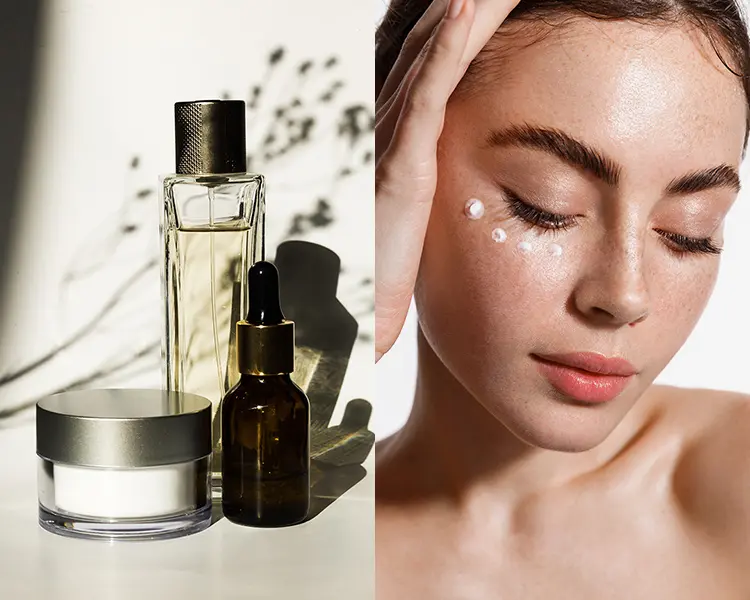Few substances have attracted as much attention and admiration in the constantly changing field of skin care as hyaluronic acid. Thanks to its natural capacity to smooth, moisturize, and plump the skin, this potent ingredient has found its way into many beauty products. Hyaluronic acid may be the key component to maintaining a youthful, glowing complexion, improving the texture of your skin, or fighting the effects of ageing.
However, what exactly is hyaluronic acid, and why does it work so well? This post will examine the benefits of this skincare superstar, go into the science behind it, and discuss why it should be a daily staple.
Hyaluronic Acid: What Is It?
Hyaluronic acid (HA) is a kind of glycosaminoglycan that occurs naturally in the human body and is primarily found in the skin, eyes, and connective tissues. Despite its somewhat scary moniker, HA is a mild molecule that binds moisture and is essential for maintaining youthful skin hydration.
The remarkable property of hyaluronic acid is its capacity to bind 1,000 times its weight in water. As a result, it is exceptionally good at drawing in and holding onto moisture to keep the skin hydrated, smooth, and plump. The body’s natural hyaluronic acid production declines with age, causing fine lines, wrinkles, and dry, sagging skin. Through skincare products that replenish the skin with hyaluronic acid, we can help combat some of the apparent symptoms of ageing and restore moisture levels.
The Mechanisms of Hyaluronic Acid
We must examine the structure and interactions of hyaluronic acid with the skin in greater detail to comprehend why it functions so well. Hyaluronic acid is a humectant that absorbs moisture from its surroundings, including the air and the skin’s deeper layers. It then retains the moisture, sealing it away in the outermost layers of the skin, where it is most needed.
There are many molecular weights of hyaluronic acid, and each has a slightly different purpose:
Hyaluronic acid with a high molecular weight: This type of HA forms a protective layer on top of the skin to retain moisture and stop water loss. It smoothes fine wrinkles and gives a dewy, radiant complexion, providing instant surface-level hydration and a transient plumping effect.
Low-molecular-weight hyaluronic acid: Tinier molecules penetrate deeper to hydrate the interior layers of the skin for a longer period of time. Over time, this kind of HA is better at enhancing the skin’s firmness, elasticity, and general texture.
Using solutions that target several layers of the skin with both high- and low-molecular-weight hyaluronic acid will provide thorough hydration.
The Skin’s Advantages of Hyaluronic Acid:
1. Intensive Hydration
Hyaluronic acid’s superior capacity to moisturize the skin is its main advantage. Properly hydrated skin looks smoother, plumper, and more young. Dry, dehydrated skin can accentuate fine lines and wrinkles. Hyaluronic acid contributes to your skin’s hydrated and healthy-looking appearance by keeping it hydrated throughout the day.
One of its finest features is hyaluronic acid’s compatibility with all skin types, especially oily and acne-prone skin. Its non-greasy, lightweight texture moisturizes the skin without clogging pores or creating breakouts, making it a flexible choice for anybody wishing to increase their skin’s moisture content.
2. The Plumping Impact
Hyaluronic acid’s moisturizing qualities naturally fill the skin, lessening the visibility of wrinkles and fine lines. When well-hydrated, skin seems firmer and fuller, and small wrinkles are less obvious. Hyaluronic acid is a favourite ingredient in anti-ageing treatments because of its instant plumping effect, providing short—and long-term advantages for a more youthful face.
3. Enhances Firmness and Elasticity of Skin
As we age, our skin becomes less elastic, causing wrinkles and sagging. Over time, hyaluronic acid helps to increase the suppleness and firmness of the skin by providing deep-layer hydration. As a consequence, the skin feels more toned, supple, and robust.
Besides its immediate moisturizing properties, hyaluronic acid also contributes to collagen formation. The protein collagen keeps the skin taut and structurally intact, but as we age, less collagen is produced. Hyaluronic acid promotes the creation of collagen, keeping the skin looking tight and young for a more extended period.
4. Strengthens the Ocular Barrier
Protecting your skin from external stresses like pollution, UV rays, and inclement weather depends on the skin’s natural barrier function. It is possible for problems like sensitivity, dryness, and irritation to arise from a compromised or fragile skin barrier. By keeping the skin hydrated and minimizing water loss, hyaluronic acid helps to fortify the skin’s barrier, improving the skin’s defenses against outside aggressors.
A sound skin barrier prevents irritants and dangerous microorganisms from entering the skin and lowers the risk of breakouts, irritation, and other skin problems.
5. Relieves and Calms Skin Irritation
Hyaluronic acid can be a calming and gentle addition to your skincare routine if you have sensitive or reactive skin. It’s an excellent option for people with rosacea, eczema, or sensitive skin because of its relaxing qualities, which help reduce redness and irritation.
Hyaluronic acid, a naturally occurring substance in the body, is safe for even the most sensitive skin types and is unlikely to irritate or trigger allergic responses.
6. Non-Toxic and Minimal Weight
Due to its non-comedogenic properties, hyaluronic acid is a great moisturizing ingredient for people with oily or acne-prone skin because it won’t clog your pores. Because of its lightweight nature, it absorbs into the skin fast and leaves it feeling hydrated, silky, and fresh without leaving a greasy aftereffect.
7. Formulation Flexibility
Numerous skincare products, such as cleansers, masks, moisturizers, and serums, include hyaluronic acid. Because of its adaptability, a hyaluronic acid product can work well with your routine, regardless of your skin type or unique skincare concerns. Hyaluronic acid is versatile enough to meet your needs, whether you’re looking for a lightweight serum for everyday hydration or a heavy moisturizer for intense nourishment.
How to Use Hyaluronic Acid in Your Daily Skincare Regimen
(HA) is easy to incorporate into your skincare routine and is suitable for daytime use due to its mild nature. Here’s how to maximize the benefits of this super hydrator:
1. Use on Wet Skin
For optimal effects, (HA) should be applied to slightly wet skin. Apply your (HA) serum or moisturizer first, then spritz your face with a moisturizing toner or mist. This optimizes the moisturizing effects of (HA) by helping it take water into the skin more efficiently.
2. Combine with Additional Items
(HA) is a flexible addition to your routine because it can be easily combined with other skincare products. Apply it before using your heavier creams or oils and after cleaning. (HA) absorbs into the skin quickly due to its lightweight nature, so if you’re using many serums, start with this one.
3. Use Each Day Twice
(HA) is mild enough for regular use in your morning and evening skincare routines. Use it before applying sunscreen first thing in the morning to keep your skin hydrated all day. Use it at night to seal moisture as you sleep, right after cleansing but before applying moisturizer.
4. Select the Appropriate Skin Type Product
There are various types of (HA), so pick the one that best fits your skin type and concerns:
Serums: A (HA) serum is an excellent method of giving the skin a concentrated dose of hydration. These lightweight formulations absorb rapidly and are suitable for all skin types.
Moisturizers: If you like a fuller texture, look for a moisturizer with (HA). These compositions offer moisture for an extended period and are especially helpful for dry or aged skin.
Masks: For an additional boost in hydration, apply a moisturizing mask containing (HA) once or twice a week.
For Whom Is Hyaluronic Acid Suitable?
All skin types and ages can benefit from (HA), one of its best qualities. Hyaluronic acid can aid in improving skin texture and hydration whether you have sensitive, oily, combination, or dry skin types. It’s very advantageous for:
Dry Skin: (HA) replenishes moisture and stops water loss, making it a lifesaver for dry skin.
Ageing Skin:(HA) plumping and moisturizing properties will help smooth the skin and enhance suppleness, lessening the appearance of fine lines and wrinkles.
Oily or Acne-Prone Skin: (HA) is an excellent option for people with oily or acne-prone skin who still require hydration without running the danger of breakouts because of its lightweight, non-comedogenic nature.
Sensitive Skin: (HA) is excellent for people with reactive or sensitive skin because it is non-irritating and mild.
In summary
Nothing short of a skincare miracle is (HA). It’s a flexible and powerful component that should be a part of any skincare routine because of its capacity to smooth, moisturize, and plump up the face. (HA) produces noticeable benefits with little effort, whether your goal is to preserve youthful skin, enhance texture, or increase moisture. You can benefit from smoother, firmer, and more radiant skin for years if you include it in your routine.



